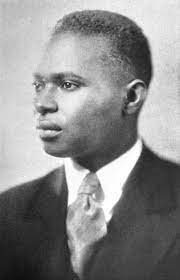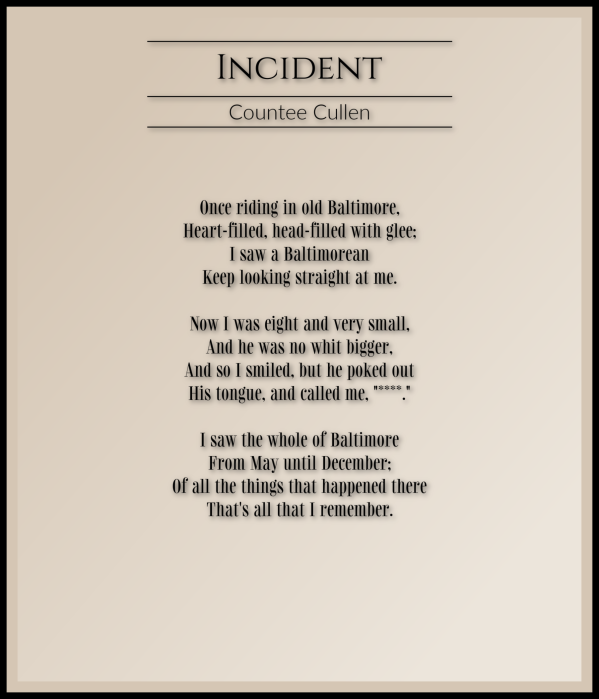
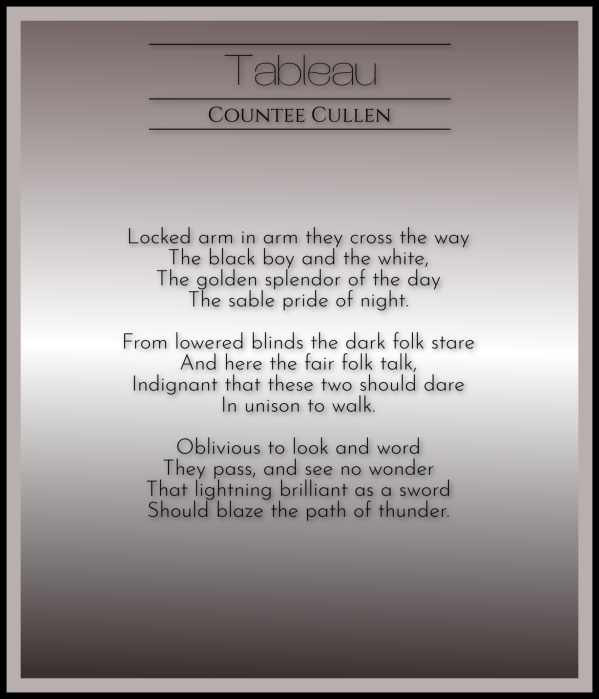
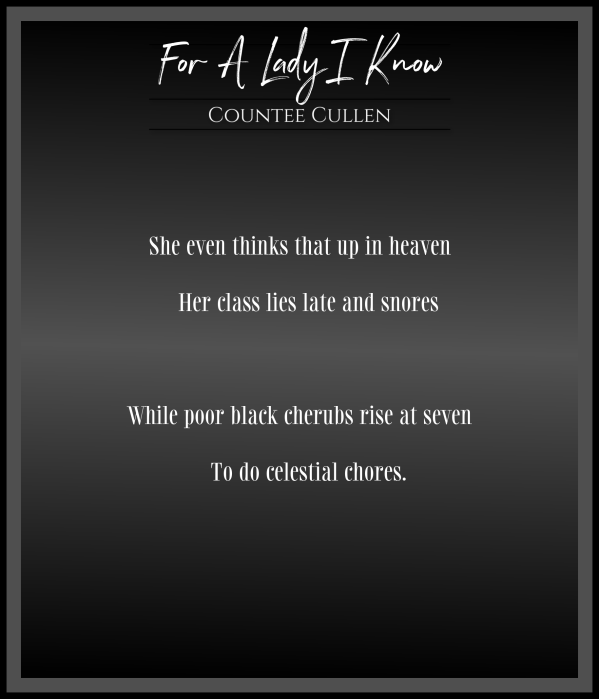
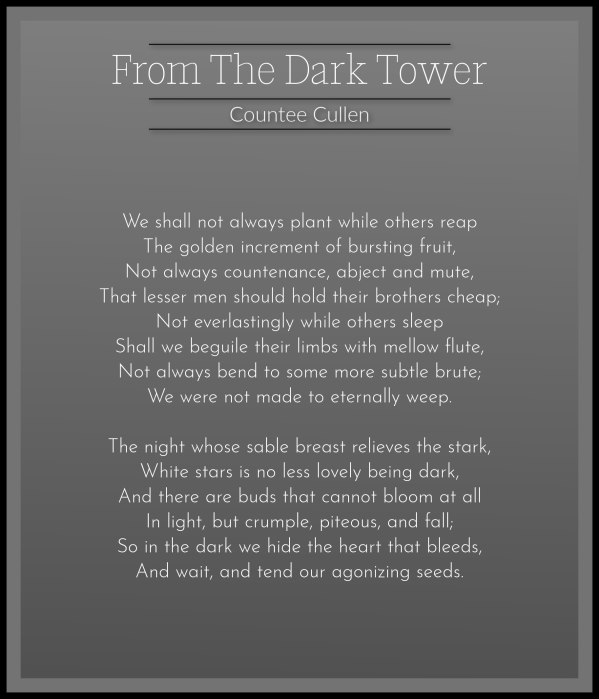
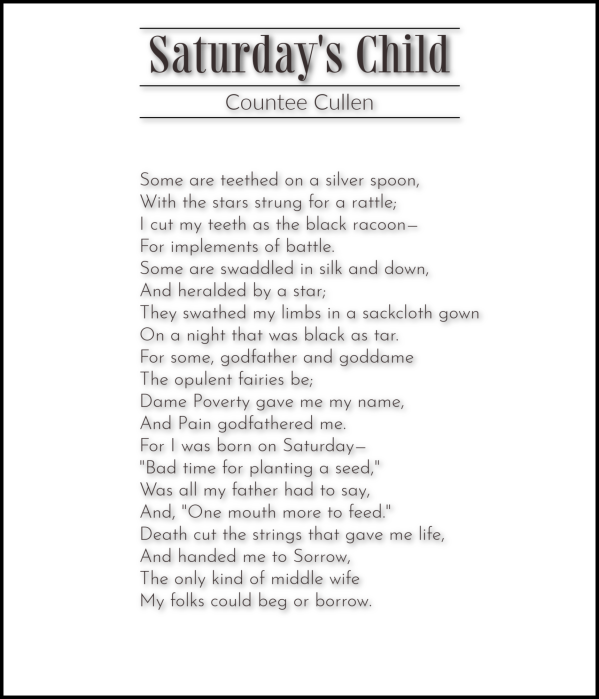
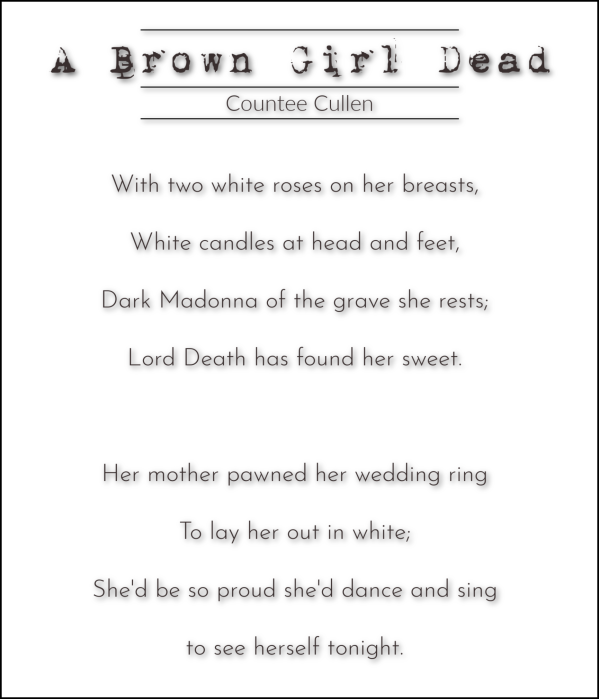
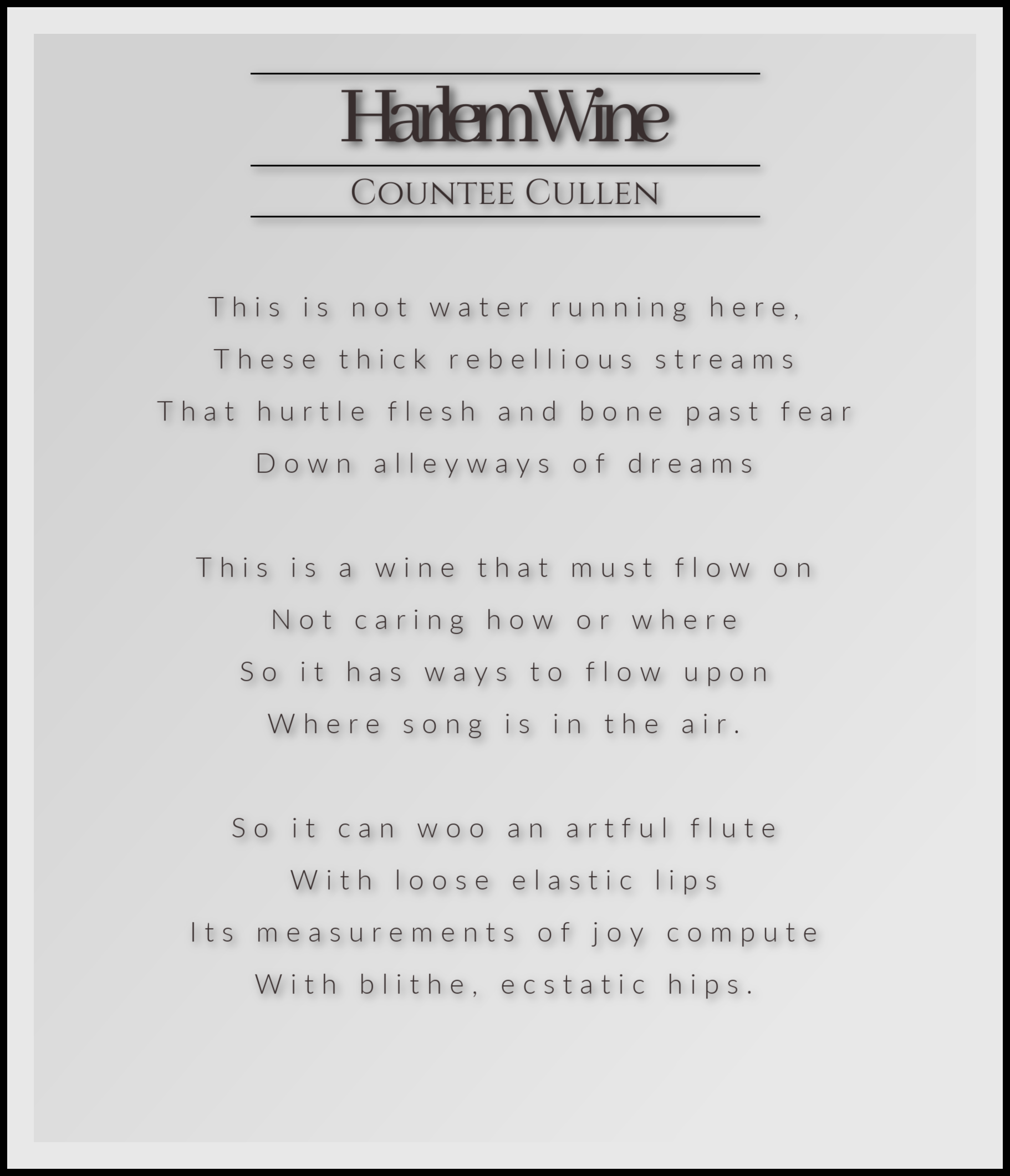
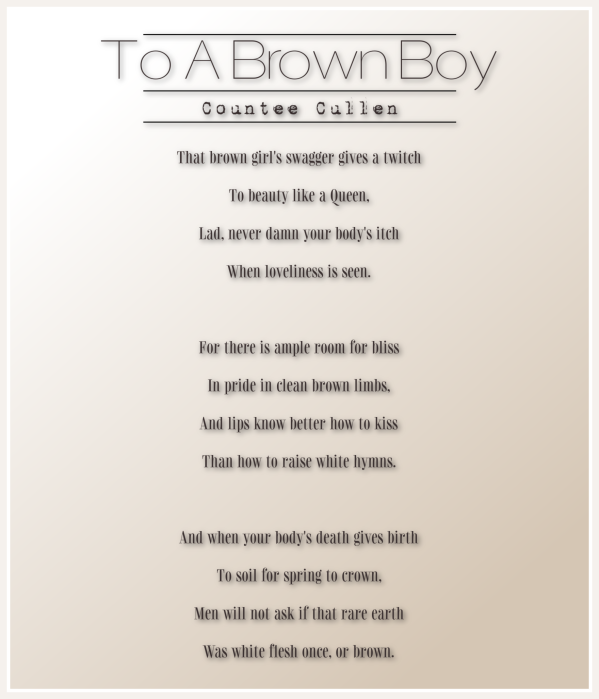
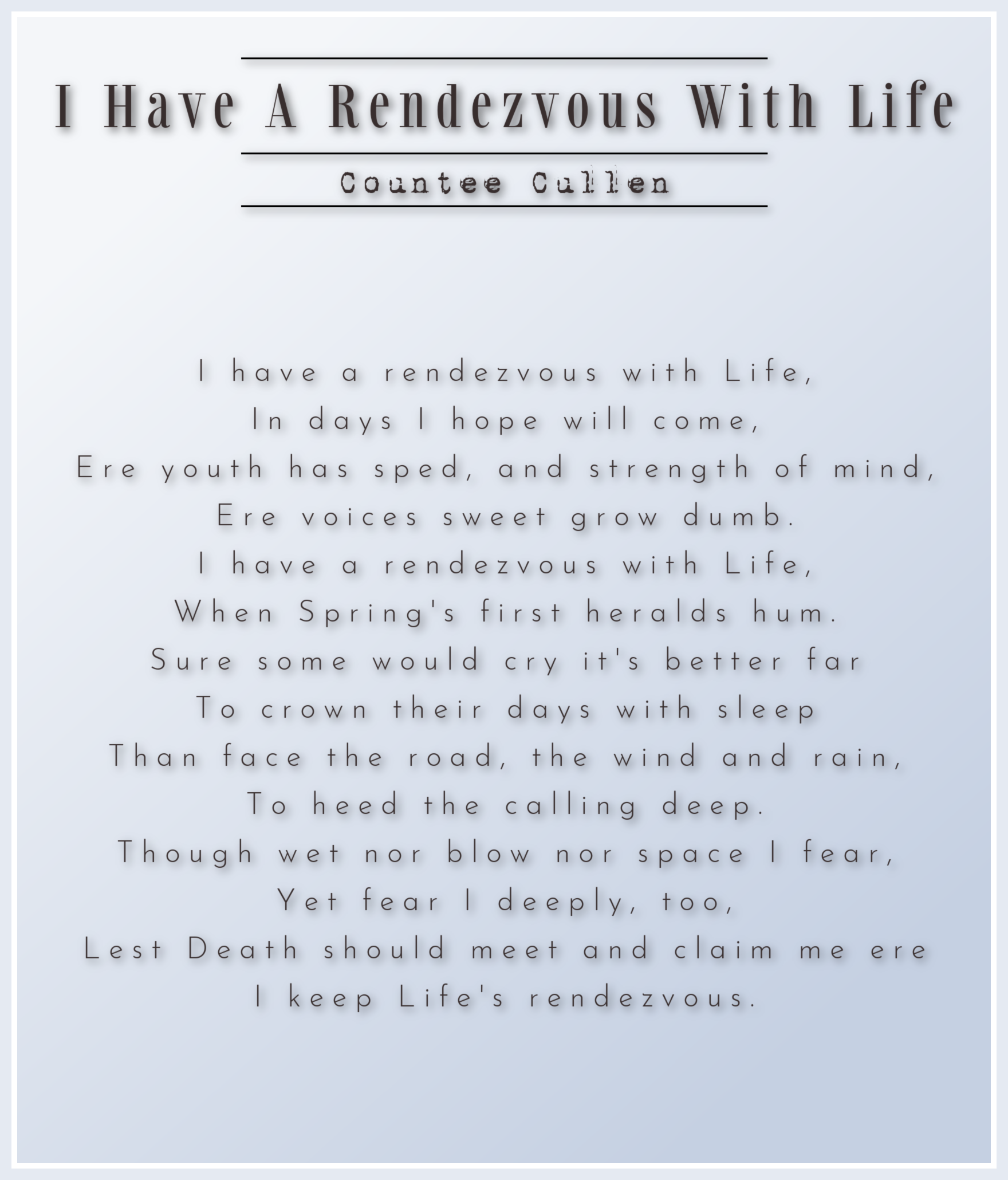
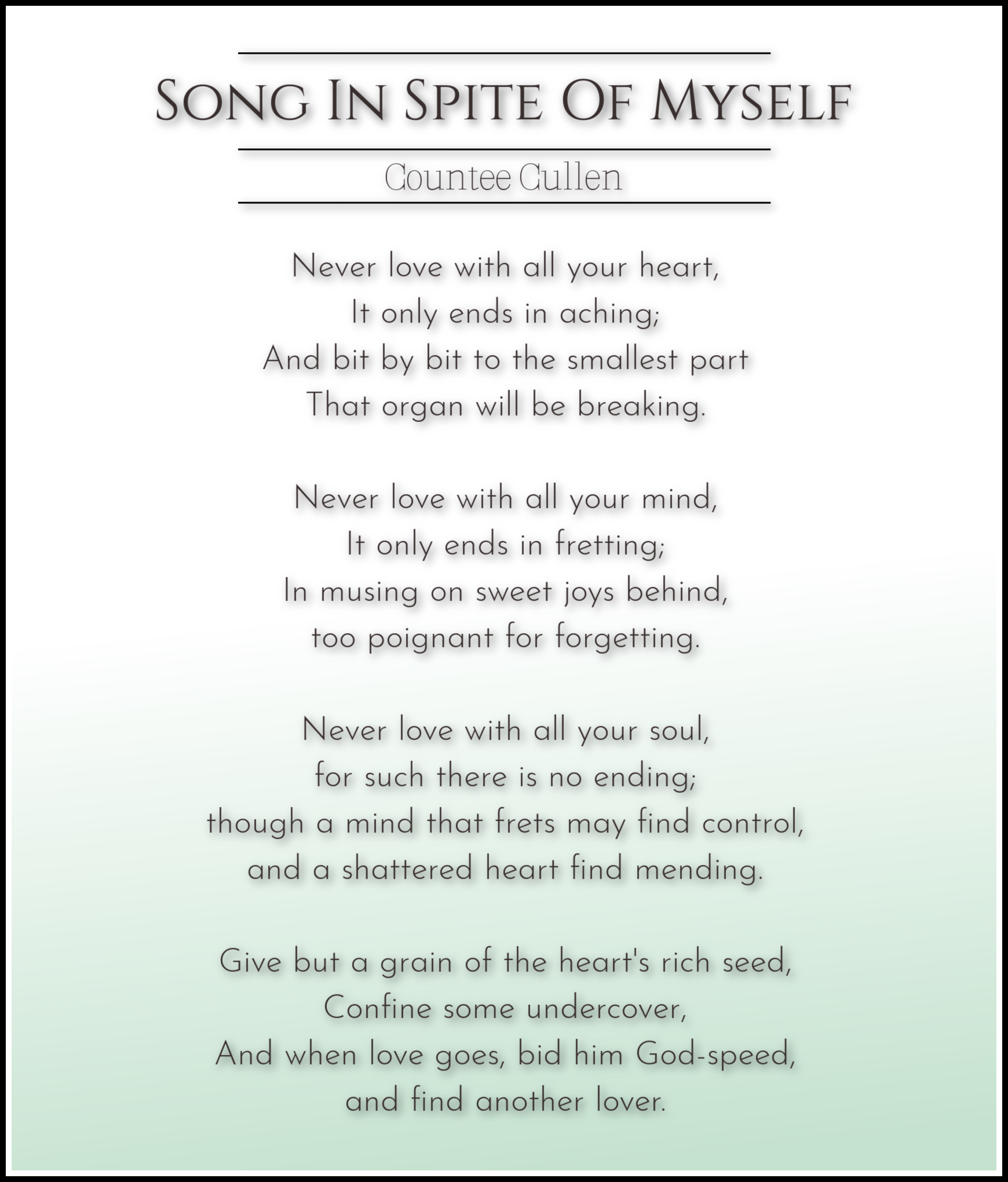
Heritage
What is Africa to me:
Copper sun or scarlet sea,
Jungle star or jungle track,
Strong bronzed men, or regal black
Women from whose loins I sprang
When the birds of Eden sang?
One three centuries removed
From the scenes his fathers loved,
Spicy grove, cinnamon tree,
What is Africa to me?
So I lie, who all day long
Want no sound except the song
Sung by wild barbaric birds
Goading massive jungle herds,
Juggernauts of flesh that pass
Trampling tall defiant grass
Where young forest lovers lie,
Plighting troth beneath the sky.
So I lie, who always hear,
Though I cram against my ear
Both my thumbs, and keep them there,
Great drums throbbing through the air.
So I lie, whose fount of pride,
Dear distress, and joy allied,
Is my somber flesh and skin,
With the dark blood dammed within
Like great pulsing tides of wine
That, I fear, must burst the fine
Channels of the chafing net
Where they surge and foam and fret.
Africa? A book one thumbs
Listlessly, till slumber comes.
Unremembered are her bats
Circling through the night, her cats
Crouching in the river reeds,
Stalking gentle flesh that feeds
By the river brink; no more
Does the bugle-throated roar
Cry that monarch claws have leapt
From the scabbards where they slept.
Silver snakes that once a year
Doff the lovely coats you wear,
Seek no covert in your fear
Lest a mortal eye should see
What's your nakedness to me?
Here no leprous flowers rear
Fierce corollas in the air;
Here no bodies sleek and wet,
Dripping mingled rain and sweat,
Tread the savage measures of
Jungle boys and girls in love.
What is last year's snow to me,
Last year's anything? The tree
Budding yearly must forget
How its past arose or set—
Bough and blossom, flower, fruit,
Even what shy bird with mute
Wonder at her travail there,
Meekly labored in its hair.
One three centuries removed
From the scenes his fathers loved,
Spicy grove, cinnamon tree,
What is Africa to me?
So I lie, who find no peace
Night or day, no slight release
From the unremittent beat
Made by cruel padded feet
Walking through my body's street.
Up and down they go, and back,
Treading out a jungle track.
So I lie, who never quite
Safely sleep from rain at night—
I can never rest at all
When the rain begins to fall;
Like a soul gone mad with pain
I must match its weird refrain;
Ever must I twist and squirm,
Writhing like a baited worm,
While its primal measures drip
Through my body, crying, "Strip!
Doff this new exuberance.
Come and dance the Lover's Dance!"
In an old remembered way
Rain works on me night and day.
Quaint, outlandish heathen gods
Black men fashion out of rods,
Clay, and brittle bits of stone,
In a likeness like their own,
My conversion came high-priced;
I belong to Jesus Christ,
Preacher of Humility;
Heathen gods are naught to me.
Father, Son, and Holy Ghost,
So I make an idle boast;
Jesus of the twice-turned cheek,
Lamb of God, although I speak
With my mouth thus, in my heart
Do I play a double part.
Ever at Thy glowing altar
Must my heart grow sick and falter,
Wishing He I served were black,
Thinking then it would not lack
Precedent of pain to guide it,
Let who would or might deride it;
Surely then this flesh would know
Yours had borne a kindred woe.
Lord, I fashion dark gods, too,
Daring even to give You
Dark despairing features where,
Crowned with dark rebellious hair,
Patience wavers just so much as
Mortal grief compels, while touches
Quick and hot, of anger, rise
To smitten cheek and weary eyes.
Lord, forgive me if my need
Sometimes shapes a human creed.
All day long and all night through,
One thing only must I do:
Quench my pride and cool my blood,
Lest I perish in the flood,
Lest a hidden ember set
Timber that I thought was wet
Burning like the dryest flax,
Melting like the merest wax,
Lest the grave restore its dead.
Not yet has my heart or head
In the least way realized
They and I are civilized.
Song In Spite Of Myself
Never love with all your heart,
It only ends in aching;
And bit by bit to the smallest part
That organ will be breaking.
Never love with all your mind,
It only ends in fretting;
In musing on sweet joys behind,
too poignant for forgetting.
Never love with all your soul,
for such there is no ending;
though a mind that frets may find control,
and a shattered heart find mending.
Give but a grain of the heart's rich seed,
Confine some undercover,
And when love goes, bid him God-speed,
and find another lover.
Simon The Cyrenian Speaks
He never spoke a word to me,
And yet He called my name;
He never gave a sign to me,
And yet I knew and came.
At first I said, "I will not bear
His cross upon my back;
He only seeks to place it there
Because my skin is black."
But He was dying for a dream,
And He was very meek,
And in His eyes there shone a gleam
Men journey far to seek.
It was Himself my pity bought;
I did for Christ alone
What all of Rome could not have wrought
With bruise of lash or stone.
The Wise
Dead men are wisest, for they know
How far the roots of flowers go,
How long a seed must rot to grow.
Dead men alone bear frost and rain
On throbless heart and heatless brain,
And feel no stir of joy or pain.
Dead men alone are satiate;
They sleep and dream and have no weight,
To curb their rest, of love or hate.
Strange, men should flee their company,
Or think me strange who long to be
Wrapped in their cool immunity.
For A Poet
To John Gaston Edgar
I have wrapped my dreams in a silken cloth,
And laid them away in a box of gold;
Where long will cling the lips of the moth,
I have wrapped my dreams in a silken cloth;
I hide no hate; I am not even wroth
Who found earth's breath so keen and cold;
I have wrapped my dreams in a silken cloth,
And laid them away in a box of gold.
She Of The Dancing Feet Sings
And what would I do in heaven pray,
Me with my dancing feet?
And limbs like apple boughs that sway
When the gusty rain winds beat.
And how would I thrive in a perfect place
Where dancing would be a sin,
With not a man to love my face,
Nor an arm to hold me in?
The seraphs and the cherubim
Would be too proud to bend,
To sing the faery tunes that brim
My heart from end to end.
The wistful angels down in hell
Will smile to see my face,
And understand, because they fell
From that all-perfect place.
Yet Do I Marvel
I doubt not God is good, well-meaning, kind
And did He stoop to quibble could tell why
The little buried mole continues blind,
Why flesh that mirrors Him must some day die,
Make plain the reason tortured Tantalus
Is baited by the fickle fruit, declare
If merely brute caprice dooms Sisyphus
To struggle up a never-ending stair.
Inscrutable His ways are, and immune
To catechism by a mind too strewn
With petty cares to slightly understand
What awful brain compels His awful hand.
Yet do I marvel at this curious thing:
To make a poet black, and bid him sing!
Fruit Of The Flower
My father is a quiet man
With sober, steady ways;
For simile, a folded fan;
His nights are like his days.
My mother's life is puritan,
No hint of cavalier,
A pool so calm you're sure it can
Have little depth to fear.
And yet my father's eyes can boast
How full his life has been;
There haunts them yet the languid ghost
Of some still sacred sin.
And though my mother chants of God,
And of the mystic river,
I've seen a bit of checkered sod
Set all her flesh aquiver.
Why should he deem it pure mischance
A son of his is fain
To do a naked tribal dance
Each time he hears the rain?
Why should she think it devil's art
That all my songs should be
Of love and lovers, broken heart,
And wild sweet agony?
Who plants a seed begets a bud,
Extract of that same root;
Why marvel at the hectic blood
That flushes this wild fruit?
Youth Sings A Song Of Rosebuds
Since men grow diffident at last,
And care no whit at all,
If spring be come, or the fall be past,
Or how the cool rains fall,
I come to no flower but I pluck,
I raise no cup but I sip,
For a mouth is the best of sweets to suck;
The oldest wine's on the lip.
If I grow old in a year or two,
And come to the querulous song
Of "Alack and aday" and "This was true,
And that, when I was young,"
I must have sweets to remember by,
Some blossom saved from the mire,
Some death-rebellious ember I
Can fan into a fire.
To Certain Critics
Then call me traitor if you must,
Shout reason and default!
Say I betray a sacred trust
Aching beyond this vault.
I'll bear your censure as your praise,
For never shall the clan
Confine my singing to its ways
Beyond the ways of man.
No racial option narrows grief,
Pain is not patriot,
And sorrow plaits her dismal leaf
For all as lief as not.
With blind sheep groping every hill,
Searching an oriflamme,
How shall the shepherd heart then thrill
To only the darker lamb?
In Memory Of Col. Charles Young
Along the shore the tall thin grass,
That fringes that dark river,
While sinuously soft feet pass
Beings to bleed and quiver.
The great dark voice breaks with a sob
Across the womb of night;
Above your grave, the tom-toms throb
And the hills are weird with light.
The great dark beast is like a well
Drained bitter by the sky,
And all the honeyed lies they tell
Come there to thirst and die.
No lie is strong enough to kill
The roots that work below,
From your rich dust and slaughtered will
A tree with tongues shall grow.
Lines To My Father
The many sow, but only the chosen reap;
Happy the wretched host if Day be brief,
That with the cool oblivion of sleep
A dawnless Night may soothe the smart of grief.
If from the soil our sweat enriches sprout
One meagre blossom for our hands to cull,
Accustomed indigence provokes a shout
Of praise that life becomes so bountiful.
Now ushered regally into your own,
Look where you will, as far as eye can see,
Your little seeds are to a fullness grown,
And golden fruit is ripe on every tree.
Yours is no fairy gift, no heritage
Without travail, to which weak wills aspire;
This is a merited and grief-earned wage
From One Who holds His servants worth their hire.
So has the shyest of your dreams come true,
Built not of sand, but of the solid rock,
Impregnable to all that may accrue
Of elemental rage: storm, stress, and shock.
That Bright Chimeric Beast
That bright chimeric beast
Conceived yet never born,
Save in the poet's breast,
The white-flanked unicorn,
Never may be shaken
From his solitude;
Never may be taken
In any earthly wood.
That bird forever feathered,
Of its new self the sire,
After aeons weathered,
Reincarnate by fire,
Falcon may not nor eagle
Swerve from his eyrie,
Nor any crumb inveigle
Down to an earthly tree.
That fish of the dread regime
Invented to become
The fable and the dream
Of the Lord's aquarium,
Leviathan, the jointed
Harpoon was never wrought
By which the Lord's anointed
Will suffer to be caught.
Bird of the deathless breast,
Fish of the frantic fin,
That bright chimeric beast
Flashing the argent skin,—
If beasts like these you'd harry,
Plumb then the poet's dream;
Make it your aviary,
Make it your wood and stream.
There only shall the swish
Be heard of the regal fish;
There like a golden knife
Dart the feet of the unicorn,
And there, death brought to life,
The dead bird be reborn.
To John Keats, Poet, At Spring Time
I cannot hold my peace, John Keats;
There never was a spring like this;
It is an echo, that repeats
My last year's song and next year's bliss.
I know, in spite of all men say
Of Beauty, you have felt her most.
Yea, even in your grave her way
Is laid. Poor, troubled, lyric ghost,
Spring never was so fair and dear
As Beauty makes her seem this year.
I cannot hold my peace, John Keats,
I am as helpless in the toil
Of Spring as any lamb that bleats
To feel the solid earth recoil
Beneath his puny legs. Spring beats
her tocsin call to those who love her,
And lo! the dogwood petals cover
Her breast with drifts of snow, and sleek
White gulls fly screaming to her, and hover
About her shoulders, and kiss her cheek,
While white and purple lilacs muster
A strength that bears them to a cluster
Of color and odor; for her sake
All things that slept are now awake.
And you and I, shall we lie still,
John Keats, while Beauty summons us?
Somehow I feel your sensitive will
Is pulsing up some tremulous
Sap road of a maple tree, whose leaves
Grow music as they grow, since your
Wild voice is in them, a harp that grieves
For life that opens death's dark door.
Though dust, your fingers still can push
The Vision Splendid to a birth,
Though now they work as grass in the hush
Of the night on the broad sweet page of the earth.
"John Keats is dead," they say, but I
Who hear your full insistent cry
In bud and blossom, leaf and tree,
Know John Keats still writes poetry.
And while my head is earthward bowed
To read new life sprung from your shroud,
Folks seeing me must think it strange
That merely spring should so derange
My mind. They do not know that you,
John Keats, keep revel with me, too.
|
|
